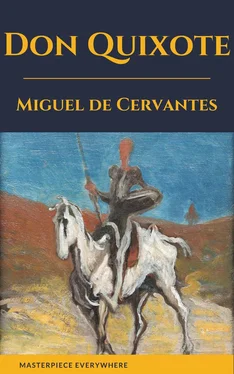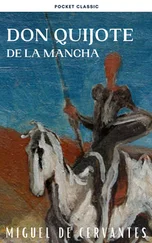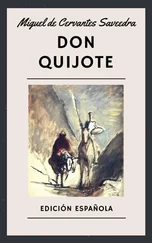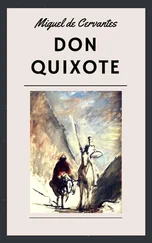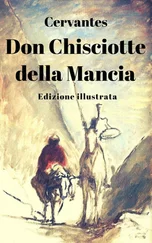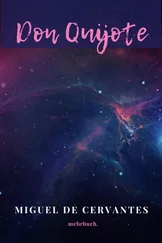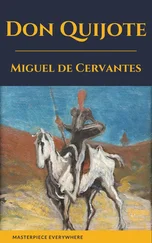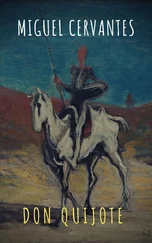Sancho bade him remember it was dinner-time, to which his master answered that he wanted nothing himself just then, but that he might eat when he had a mind. With this permission Sancho settled himself as comfortably as he could on his beast, and taking out of the alforjas what he had stowed away in them, he jogged along behind his master munching deliberately, and from time to time taking a pull at the bota with a relish that the thirstiest tapster in Malaga might have envied; and while he went on in this way, gulping down draught after draught, he never gave a thought to any of the promises his master had made him, nor did he rate it as hardship but rather as recreation going in quest of adventures, however dangerous they might be. Finally they passed the night among some trees, from one of which Don Quixote plucked a dry branch to serve him after a fashion as a lance, and fixed on it the head he had removed from the broken one. All that night Don Quixote lay awake thinking of his lady Dulcinea, in order to conform to what he had read in his books, how many a night in the forests and deserts knights used to lie sleepless supported by the memory of their mistresses. Not so did Sancho Panza spend it, for having his stomach full of something stronger than chicory water he made but one sleep of it, and, if his master had not called him, neither the rays of the sun beating on his face nor all the cheery notes of the birds welcoming the approach of day would have had power to waken him. On getting up he tried the bota and found it somewhat less full than the night before, which grieved his heart because they did not seem to be on the way to remedy the deficiency readily. Don Quixote did not care to break his fast, for, as has been already said, he confined himself to savoury recollections for nourishment.
They returned to the road they had set out with, leading to Puerto Lapice, and at three in the afternoon they came in sight of it. "Here, brother Sancho Panza," said Don Quixote when he saw it, "we may plunge our hands up to the elbows in what they call adventures; but observe, even shouldst thou see me in the greatest danger in the world, thou must not put a hand to thy sword in my defence, unless indeed thou perceivest that those who assail me are rabble or base folk; for in that case thou mayest very properly aid me; but if they be knights it is on no account permitted or allowed thee by the laws of knighthood to help me until thou hast been dubbed a knight."
"Most certainly, senor," replied Sancho, "your worship shall be fully obeyed in this matter; all the more as of myself I am peaceful and no friend to mixing in strife and quarrels: it is true that as regards the defence of my own person I shall not give much heed to those laws, for laws human and divine allow each one to defend himself against any assailant whatever."
"That I grant," said Don Quixote, "but in this matter of aiding me against knights thou must put a restraint upon thy natural impetuosity."
"I will do so, I promise you," answered Sancho, "and will keep this precept as carefully as Sunday."
While they were thus talking there appeared on the road two friars of the order of St. Benedict, mounted on two dromedaries, for not less tall were the two mules they rode on. They wore travelling spectacles and carried sunshades; and behind them came a coach attended by four or five persons on horseback and two muleteers on foot. In the coach there was, as afterwards appeared, a Biscay lady on her way to Seville, where her husband was about to take passage for the Indies with an appointment of high honour. The friars, though going the same road, were not in her company; but the moment Don Quixote perceived them he said to his squire, "Either I am mistaken, or this is going to be the most famous adventure that has ever been seen, for those black bodies we see there must be, and doubtless are, magicians who are carrying off some stolen princess in that coach, and with all my might I must undo this wrong."
"This will be worse than the windmills," said Sancho. "Look, senor; those are friars of St. Benedict, and the coach plainly belongs to some travellers: I tell you to mind well what you are about and don't let the devil mislead you."
"I have told thee already, Sancho," replied Don Quixote, "that on the subject of adventures thou knowest little. What I say is the truth, as thou shalt see presently."
So saying, he advanced and posted himself in the middle of the road along which the friars were coming, and as soon as he thought they had come near enough to hear what he said, he cried aloud, "Devilish and unnatural beings, release instantly the highborn princesses whom you are carrying off by force in this coach, else prepare to meet a speedy death as the just punishment of your evil deeds."
The friars drew rein and stood wondering at the appearance of Don Quixote as well as at his words, to which they replied, "Senor Caballero, we are not devilish or unnatural, but two brothers of St. Benedict following our road, nor do we know whether or not there are any captive princesses coming in this coach."
"No soft words with me, for I know you, lying rabble," said Don Quixote, and without waiting for a reply he spurred Rocinante and with levelled lance charged the first friar with such fury and determination, that, if the friar had not flung himself off the mule, he would have brought him to the ground against his will, and sore wounded, if not killed outright. The second brother, seeing how his comrade was treated, drove his heels into his castle of a mule and made off across the country faster than the wind.
Sancho Panza, when he saw the friar on the ground, dismounting briskly from his ass, rushed towards him and began to strip off his gown. At that instant the friars muleteers came up and asked what he was stripping him for. Sancho answered them that this fell to him lawfully as spoil of the battle which his lord Don Quixote had won. The muleteers, who had no idea of a joke and did not understand all this about battles and spoils, seeing that Don Quixote was some distance off talking to the travellers in the coach, fell upon Sancho, knocked him down, and leaving hardly a hair in his beard, belaboured him with kicks and left him stretched breathless and senseless on the ground; and without any more delay helped the friar to mount, who, trembling, terrified, and pale, as soon as he found himself in the saddle, spurred after his companion, who was standing at a distance looking on, watching the result of the onslaught; then, not caring to wait for the end of the affair just begun, they pursued their journey making more crosses than if they had the devil after them.
Don Quixote was, as has been said, speaking to the lady in the coach: "Your beauty, lady mine," said he, "may now dispose of your person as may be most in accordance with your pleasure, for the pride of your ravishers lies prostrate on the ground through this strong arm of mine; and lest you should be pining to know the name of your deliverer, know that I am called Don Quixote of La Mancha, knight-errant and adventurer, and captive to the peerless and beautiful lady Dulcinea del Toboso: and in return for the service you have received of me I ask no more than that you should return to El Toboso, and on my behalf present yourself before that lady and tell her what I have done to set you free."
One of the squires in attendance upon the coach, a Biscayan, was listening to all Don Quixote was saying, and, perceiving that he would not allow the coach to go on, but was saying it must return at once to El Toboso, he made at him, and seizing his lance addressed him in bad Castilian and worse Biscayan after his fashion, "Begone, caballero, and ill go with thee; by the God that made me, unless thou quittest coach, slayest thee as art here a Biscayan."
Don Quixote understood him quite well, and answered him very quietly, "If thou wert a knight, as thou art none, I should have already chastised thy folly and rashness, miserable creature." To which the Biscayan returned, "I no gentleman!—I swear to God thou liest as I am Christian: if thou droppest lance and drawest sword, soon shalt thou see thou art carrying water to the cat: Biscayan on land, hidalgo at sea, hidalgo at the devil, and look, if thou sayest otherwise thou liest."
Читать дальше
